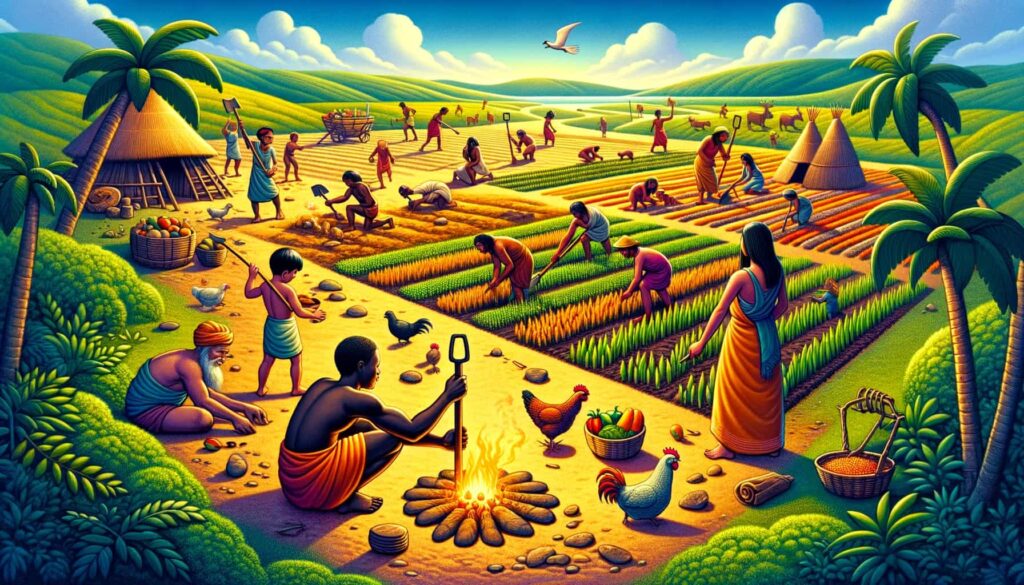Geography plays a pivotal role in shaping civilizations. The physical features of a region, such as its landforms, climate, and natural resources, profoundly influence the development and characteristics of societies. In this article, we will explore the multifaceted ways that: How does geography affect civilization and delve into its profound implications.
Yes, geography significantly influences the development of civilizations. The physical features of a region such as climate, terrain, and resources shape the way societies form, trade, and interact.
Additionally, geography can create barriers or facilitate communication and transportation, influencing cultural exchange and political structures. Overall, geography plays a crucial role in shaping the course of human civilization.
How Does Geography Affect Civilization?
Climate, a critical element of geography, has an immense impact on the trajectory of a civilization. The ancient civilizations of Egypt, Mesopotamia, and the Indus Valley, for example, thrived in part due to the climate’s consistency.
For instance, a civilization located in a river valley, where fertile land is abundant, will develop differently from a civilization in a mountainous region where farming is challenging.
Contrastingly, civilizations in regions with unpredictable climates had to develop robust adaptation strategies. This was the case for civilizations in the Fertile Crescent, where fluctuating climatic conditions demanded innovative agricultural practices and technological advancements, some of which we continue to use today.
The early civilizations, like those in the Tigris-Euphrates and Indus River valleys, benefitted from fertile lands and a reliable water source, encouraging population growth and leading to advancements in various fields such as writing, government, and architecture.
On the other hand, civilizations in harsher environments often developed unique survival skills, yielding innovations in architecture, engineering, and farming techniques.
Relationship Between Geography and Civilization
Looking at the Native American tribes, we see another vivid illustration of the relationship between geography and civilization. These tribes lived across a broad range of geographical features, from the lush forests of the Northeast to the arid deserts of the Southwest. Each tribe adapted to their environment in unique ways, crafting tools, dwellings, and ways of life suited to their specific surroundings.
For example, tribes in the Great Plains area, where buffalo roamed in abundance, developed a nomadic lifestyle following the buffalo herds. Their entire civilization — from diet, clothing, shelter, to social structure — revolved around these animals.
Conversely, the Pueblo tribes of the Southwest built permanent settlements and excelled in farming, drawing life from the few rivers that snaked through their arid homeland.
How Geography Influence Civilization

There are various ways in which geography influences civilizations, from the availability of natural resources to the formation of cultural identities. By understanding these connections, we can gain insights into the complex relationship between geography and civilization.
1. The Impact of Geography on Settlement Patterns
Geography significantly influences where civilizations choose to settle. The presence of fertile land, access to water sources, and favorable climate are crucial factors determining the suitability of an area for human habitation. River valleys, for instance, provide fertile soil and water for agricultural activities, leading to the rise of flourishing civilizations like ancient Egypt and Mesopotamia.
2. Natural Resources and Economic Development
The availability or scarcity of natural resources greatly shapes the economic development of civilizations. Regions rich in valuable resources like minerals, timber, or oil can experience rapid growth and prosperity. The discovery of vast oil reserves in the Middle East, for example, has transformed the economies of countries in the region and led to significant geopolitical influences.
3. Influence on Cultural Exchange and Trade
Geographical factors also play a pivotal role in determining the extent and nature of cultural exchange and trade between civilizations. Proximity and accessibility to trade routes, such as ports and mountain passes, facilitate the exchange of goods, ideas, and technologies. The Silk Road, an ancient network of trade routes connecting Asia and Europe, fostered cultural diffusion and contributed to the development of diverse civilizations.
4. Geopolitical Considerations and Conflicts
Geography often becomes a crucial factor in geopolitical considerations and can even lead to conflicts between civilizations. Strategic locations, such as natural barriers or chokepoints, have historically been contested areas due to their significant military and economic advantages. The control of vital waterways like the Suez Canal or the Strait of Hormuz, for instance, has been a subject of geopolitical tensions.
5. Climate and Adaptation
The climate of a region profoundly affects the way civilizations adapt and develop their unique cultural practices. In harsh environments, such as deserts or Arctic regions, civilizations have developed specialized techniques for survival. The Inuit people of the Arctic, for example, have adapted to extreme cold by utilizing igloos and hunting marine mammals.
6. Influence on Political Structures
Geography can shape the political structures and systems of governance within civilizations. Mountainous regions often give rise to decentralized governance structures, with communities residing in isolated valleys developing their own political systems. On the other hand, the presence of natural borders like rivers or oceans can lead to the formation of centralized states due to the relative ease of defense and control.
7. Impact on Health and Disease Patterns
Geography plays a crucial role in determining health and disease patterns within civilizations. Access to clean water, proximity to disease vectors, and natural barriers can significantly impact the spread of diseases. For example, malaria is prevalent in tropical regions with stagnant water bodies, while high-altitude regions experience lower incidences of certain diseases due to the unfavorable conditions for disease vectors.
8. Technological Advancements and Exploration
Geographical features often provide the impetus for technological advancements and exploration. Mountainous regions, for instance, have prompted the development of techniques like terracing for agriculture or mountaineering for trade and exploration. Similarly, coastal civilizations have excelled in seafaring technologies and maritime trade, enabling them to expand their influence across vast distances.
Conclusion: How Does Geography Affect Civilization
Geography is a powerful force that shapes civilizations in myriad ways. From influencing settlement patterns to determining economic development, culture, politics, and even health, geography underpins the very fabric of human societies. By understanding and appreciating the impact of geography, we gain valuable insights into the complexities of civilizations throughout history.
FAQs: How Does Geography Affect Civilization?
How long has geography influenced civilizations?
Geography has been influencing civilizations since the dawn of human history. The earliest civilizations, such as those in Mesopotamia and Egypt, emerged in regions with favorable geographical conditions.
How does geography impact cultural diversity?
Geography influences cultural diversity by facilitating or hindering cultural exchange. Regions with easy access to trade routes tend to have more diverse cultures due to increased interactions between civilizations.
Can geography change over time and affect civilizations?
Yes, geography can change over time due to natural processes or human intervention. Environmental changes, such as deforestation or sea level rise, can have profound effects on civilizations living in affected areas.
What roles do mountains, rivers, and deserts play in influencing civilization?
Mountains, rivers, and deserts play crucial roles in civilization. They can serve as natural barriers, provide resources, impact climate, and influence trade and cultural exchanges.
Why are many ancient civilizations located near rivers?
Ancient civilizations were often located near rivers because they provided a consistent water supply, fertile land for agriculture, and a means of transportation for people and goods.
How does geography affect modern civilization?
Geography impacts modern civilization in various ways, from determining agricultural practices and influencing urban development to defining political borders and causing resource conflicts.
